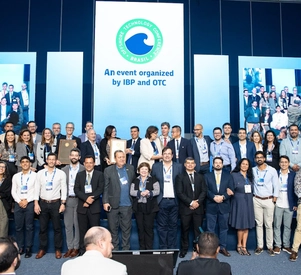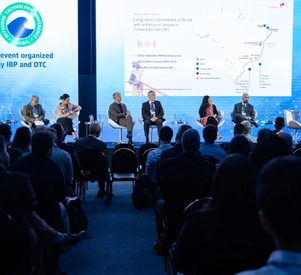Brazilian oil and gas sector reduces emissions and moves closer to 2030 climate goal seven years ahead
IBP's 2023 Emissions Inventory shows that the carbon intensity of upstream (E&P) at 15.69 kg CO₂e/BOE is very close to the Climate Plan target (15.00 kg CO₂e/BOE) for 2030, reinforcing Brazil as a low-carbon oil producer
Belém, November 17, 2025 - The Brazilian Petroleum, Gas and Biofuels Institute (IBP) is presenting today at COP30 the 3rd Inventory of Greenhouse Gas (GHG) Emissions, base year 2023. The study consolidates data from associated companies in the Upstream (Exploration & Production), Midstream (Transportation & Logistics) and Downstream (Refining & Distribution) segments and will be delivered this week to the presidency of COP30.
The main highlight of the report, produced by the consulting firm WayCarbon, is the record efficiency in national oil and gas production. The emissions intensity of the Upstream (E&P) segment dropped to 15.69 kg CO₂e/BOE (kilograms of CO₂ equivalent per barrel of oil equivalent).
This result places Brazil very close to the Climate Plan target of 15.00 kg CO₂e/BOE for 2030, meaning the sector is seven years ahead of achieving its main decarbonization goal. Furthermore, it is below the global industry average, recorded at 17.10 kg CO₂e/BOE (BP World Energy Outlook) In a global context, this data reinforces Brazil as a low-carbon oil producer.
This positive performance comes despite a scenario of production growth. The inventory shows that, even with the 13.4% increase in oil and gas production in 2023, the consolidated absolute emissions (Scope 1 and 2) of the participating companies fell by 5.8% compared to the previous year, totaling 57.56 million tons of CO₂e in 2023 against 61.11 million tons of CO₂e in 2022. This data proves the decoupling between growth and increased emissions.
"In other words, the sector stopped emitting about 3.6 million tons of CO₂, the equivalent of the emissions of a city the size of Belo Horizonte, which has 3 million inhabitants," compared Roberto Ardenghy, President and CEO of IBP.
The executive emphasizes that the data shows the effectiveness of the sector's climate management. "We are presenting audited and verifiable data that proves that energy transition is not a 'switch,' but rather a marathon of continuous improvement. Brazil will not only continue to be a global energy player, but it will do so with the lowest possible carbon impact. This Inventory is our commitment that the energy that moves the world will be produced here with climate responsibility and a focus on efficiency."
Transparency as a governance pillar
IBP reinforces the transparency of the process: the report covers 98.2% of national oil and gas production and 90.6% of Scope 1 and 2 emissions from the segments surveyed. More than half of the participating companies, 61%, had their inventories audited by independent third parties, guaranteeing the reliability of the data. This transparency is vital. The IBP emissions inventory serves as a climate management tool for industry and, more importantly, as a verifiable database for the development of public policies on the decarbonization of the sector and the Fuel of the Future agenda (Combustível do Futuro).
Highlights:
● Segmentation: Upstream (Exploration and Production) was responsible for 48.8% of emissions, followed by Downstream (Refining and Distribution) with 42.9%.
● Methane Management: Methane represented 5% of total emissions. The sector is actively engaged in the Global Methane Pledge, aiming to reduce emissions by 30% by 2030, with the Inventory acting as a basis for monitoring and mitigation.
●Biofuels: The Upstream segment stood out in CO₂ emissions from renewable sources, which are accounted for separately. This reflects the use and production of biomass for fuels, aligned with the decarbonization agenda and an important decarbonization lever aligned with the current regulation of Combustível do Futuro (Future Fuel).




